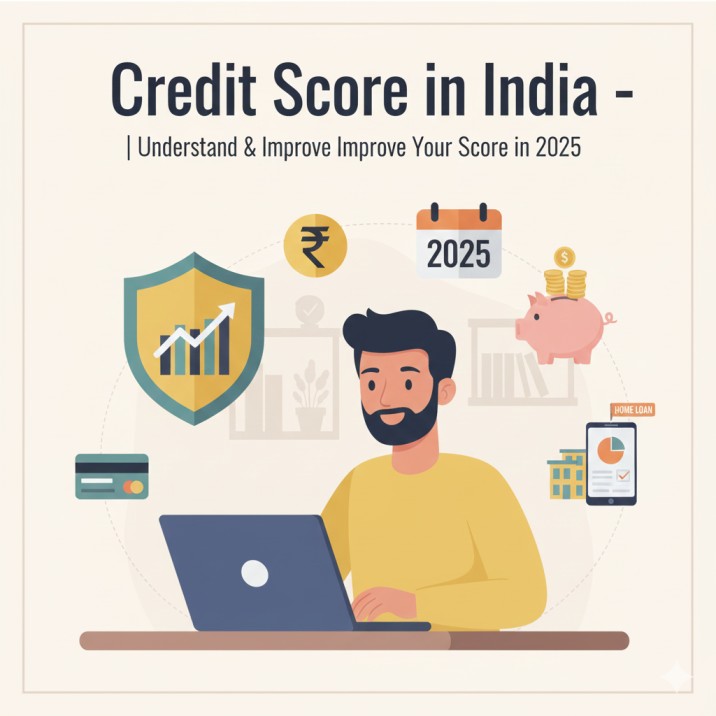Learn the basics of credit scores in India—what affects your score, why it matters, and smart ways to improve it for better financial opportunities in 2025.
Last Updated : 26-10-2025
How a Good Credit Score Changed My Life — Anuj’s Story
Meet Anuj, a young professional from Gurgaon. Initially, Anuj never thought much about credit scores. When he applied for a car loan, he was shocked to learn his credit score was below 600, leading to rejection. Anuj then educated himself, found errors in his report, started paying EMIs religiously on time, and monitored his score monthly. Within a year, Anuj’s credit score jumped to 750, enabling him to secure loans at lower rates and even get approved for a credit card. His story shows how credit awareness transforms personal finance.

What is Credit Score?
A credit score is a 3-digit number (300-900) representing your creditworthiness based on your credit history. The higher the score, the more trustworthy you appear to lenders.
| Score Range | Interpretation | Loan Approval Chances |
|---|---|---|
| 750 – 900 | Excellent | Very high, lowest interest rates |
| 700 – 749 | Good | High, favorable rates |
| 650 – 699 | Fair | Moderate, average rates |
| 600 – 649 | Poor | Low, higher rates or rejection |
| Below 600 | Very Poor | Difficulty getting loans |
How Credit Score is Calculated?
- Payment History (35%): Timely or delayed payments affect score significantly
- Credit Utilization Ratio (30%): Percentage of available credit used; keep below 30%
- Credit Age (15%): Longer credit history boosts score
- Credit Mix (10%): Variety like credit cards, personal loans help
- New Credit Enquiries (10%): Frequent loan applications can reduce score
Steps to Improve Your Credit Score in India
Step 1: Check Your Credit Report Regularly
Order your free CIBIL/Equifax/Experian report annually and review for errors that could drag your score down.
Step 2: Pay EMIs and Bills on Time
Set up auto-debits or reminders for credit cards, personal loans, and utilities to never miss a payment.
Step 3: Manage Credit Utilization
Use less than 30% of your credit limit. For example, if your card limit is ₹1 lakh, keep balance under ₹30,000.
Step 4: Keep Credit Accounts Old & Active
Keep older credit cards active by making small purchases to improve credit age and mix.
Step 5: Avoid Multiple Loan Applications in Short Time
Space your loan or credit card applications, as too many inquiries lower your score.
Real-Life Story: Sneha’s Journey from Poor to Good Credit Score
Sneha, in Bangalore, had a credit score close to 580. She checked her report and found an unpaid utility bill recorded as default. After disputing and clearing dues, she started paying EMIs on time and kept credit usage low. Over 8 months, her score increased to 720. This enabled her to buy a two-wheeler loan at competitive rates. Sneha’s story highlights the power of awareness and discipline in improving credit scores.
FAQs About Credit Score in India
Q: How often can I check my credit score for free?
A: You can get one free credit report annually from each bureau, and many apps offer free monthly updates.
Q: Does checking my score hurt it?
A: No, ‘soft’ checks don’t impact scores; only ‘hard’ enquiries from loan or credit card applications affect your score.
Q: How long do late payments affect my score?
A: Late payments can impact scores for up to 7 years unless corrected sooner.
Q: Can having no credit history lower my score?
A: Yes, no credit history means no score or very low score. Building credit history is essential.
Q: How long does it take to improve a bad credit score?
A: Typically, 6-12 months of good credit behaviour can significantly improve your score.
Credit Score Monitoring and Management Tools
| Tool/Platform | Features | Link |
|---|---|---|
| CIBIL | Credit reports, score monitoring, alerts | cibil.com |
| Experian India | Credit score checking, credit education | experian.in |
| ClearTax | Free credit score, monitoring via app | cleartax.in |
| Paisabazaar | Credit reports, score simulation tools | paisabazaar.com |
| BankBazaar | Personalized credit score advice | bankbazaar.com |
Tips for Maintaining a Healthy Credit Score
- Pay all bills including utilities promptly
- Avoid maxing out credit cards
- Keep credit card limits high but usage low
- Don’t close old credit accounts arbitrarily
- Use secured credit cards to build initial credit
Final Thoughts: Your Credit Score is Your Financial Passport
A good credit score opens doors to loans, better rates, and financial freedom. Like Anuj and Sneha, awareness, timely payments, and smart management make the difference. Treat your credit responsibly, check your reports regularly, and watch your financial opportunities grow.
You May Also Read :
Budget-Friendly Wedding Tips for Indian Families
FIRE Movement Explained (Financial Independence, Retire Early)
Smart Investment Habits of Middle-Class Indians
Disclaimer: This article is based on personal experience and is for educational purposes only. It does not constitute financial, investment, or legal advice. Readers are advised to do their own research or consult a qualified professional before making any financial decisions.


